Why Police Departments Drop Their K9 Programs
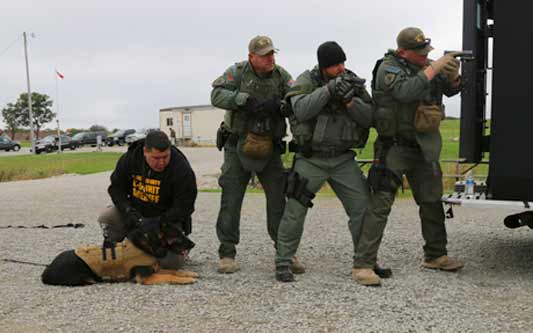
This week, I received a disturbing e-mail from a fellow K-9 officer in southeast Wisconsin. A mutual friend and K-9 Officer has had his K-9 unit disbanded by his police department. I chose this occasion to talk about the pitfalls that face every K-9 program. I talked with several friends to gather the information for this article. Maybe our thoughts can help new handlers sidestep a few of the pitfalls that every program is going to be faced with.
K-9 programs fail far too often. There are a number of major reasons for this:
- Poor initial planning; departments who choose the wrong vendor to start their program
- Poor supervision from management
- Administrators who decide they do not need the program
- Local politicians who decide they do not like the program
- Poor education among the field troops that need to use the resource to make it valuable
- Handlers who do not follow through with their responsibilities
Poor Planning Results in Selecting the Wrong Vendor
The usual way a K-9 program comes into being is an officer decides he wants to be a K-9 handler. This officer then goes to his Chief (or Sheriff) and asks permission. Supervisors exercise their authority by telling the officer to look into it and get back to them with a proposal. If the handler is lucky, he will get good advice from other departments that have successful programs. More often than not, the officer gets bad information and the results are not good.
There are far more irresponsible and untrained vendors who sell police dogs than there are real professionals. The odds are against a department ending up with a professional. That's why there are so many second- and third-rate service dogs working the street in this country. The most common mistake administrators make occurs when they start a new K-9 program by selecting an inexperienced vendor to supply their dog and train their officers.
It is hard to place all the blame on administrators for such a simple but important mistake. When you stop and think about it, how does an administrator (who has never had any K-9 experience) go about selecting a vendor? Most look to local dog trainers and breeders. Unfortunately, we again find ourselves in a situation where the odds are stacked against the administrator. Most local civilians don't have the experience to offer valuable advice.
That brings us back to the same point we were at before, with the wrong vendor and a department being supplied with a dog that does not have the proper temperament and drive for service work. When this happens, the K-9 program is doomed to failure from the day of its inception.
It's not the scope of this article to explain how to select a vendor, but the simplest advice would be to look for departments with "Successful" programs and ask where they got their dogs and training.
The departments that cause me to shake my head in disgust are those that make officers purchase their own dogs. I don't have a lot of patience for a Chief or Sheriff who does this. These officers want to get involved in K-9 more than anything in the world. Unfortunately, a selection-tested patrol dog is going to cost $3,500.00 to $4,500.00 and this is beyond the means of most officers. Officers are then forced to accept less qualified, cheaper dogs. They find themselves accepting dogs that should not be selected for service work.
Poor Management Supervision
Too often, administrators do not have a clue on how to manage a K-9 unit. In addition, they do not make an effort to learn how to manage a K-9 unit. The result is that new handlers end up without any supervision. This often leads to problems.
Administrators need to pick a K-9 supervisor who sets performance standards for the K-9 teams. This goes beyond a certification program. Supervisors need to review the training records on the dogs on a regular basis. He needs to visit the weekly training and become familiar with the capabilities and weaknesses of each dog team. He needs to verify that weaknesses are addressed in training.
Supervisors also need to visit units in other departments to watch and discuss training and deployment procedures. He needs to talk with experienced K-9 officers and not those who have only been around the dogs for a year or two. It takes a long time to become proficient in this work.
A K-9 supervisor enforces minimum standards. These should be evaluated on a timely basis. If a dog team falls below this standard, the supervisor (or head trainer or someone who is qualified to make these decisions based on experience) must evaluate the team's training. The K-9 Supervisor must have the authority to take a dog team off the street if it does not maintain a minimum standard.
Picking the right man for this job is as critical as picking the right dog handlers. Departments need to make sure that these supervisors have a clear understanding of exactly how a K-9 program should run. This means that these supervisors need K-9 supervisor training just as the handlers need training.
Administrators feel they don't need the K-9 Program
It is not unheard of for a city program to fail because the County has an experienced effective K-9 program (or visa versa).
When the opposing law enforcement entity has a successful program, new handlers will have their performance compared to this other unit. This is a difficult situation for a new handler. Administrators (without experience) expect to see immediate results. They compare their handler's results to the experienced handlers right next door. This is a little foolish when these same administrators don't expect new officers to perform at the same level as experienced veterans. They run new recruits through a 3 to 6 months FTO (field training officer) program, but they expect their K-9 handler to show results right away. The K-9 supervisor needs to work with administrators to come up with a comprehensive K-9 policy and procedure manual. It's the supervisor's responsibility to see to it that the entire department follows this policy. A good example is that a dog should clear a burglary building before the officers go inside, not the other way around. When patrol officers break policy, they need to have a talk. If the problem continues, they need a letter of discipline in their personnel file.
Administrators need to understand that service dogs are no different than new recruits. The K-9 team gets better with time. Nothing can substitute on-the-job experience. I believe a new dog team takes a year to gain the confidence needed to reach peak performance. A perfect example of this is the RCMP in Canada. They run their new handlers through a 20-week training course before they are put on the street. Then a year later, they are brought back to the training center and are expected to re-certify at a higher standard.
Dealing with Local Politicians
It's the K-9 handler's job to become a politician. He has to continually sell his program. This program NEVER stops. There is no better way to accomplish this than to get out and give talks to the graduating DARE classes and the Boy Scouts Blue Gold dinners. Handlers need to understand that people are interested in police dogs. So they must seek out people in the Lyons Club, Rotary, Optimists etc. They must work at coming up with an interesting talk about their dogs, their training, their accomplishments, and role in law enforcement. This talk should be constantly evolving work in process.
If a handler does his job properly, he or she will build a broad-based support group that will come to the rescue when a politician or administrator wants to cancel a program. A well-run K-9 program is a valuable tool for every law enforcement entity. With enough pressure from the public, the people who try to eliminate these programs will find other areas to make their needed budgetary cuts.
It is also worth pointing out to both officials and administrators that in the scheme of things, a dog program is not very expensive. When one thinks that a new squad car costs $30,000 after it's decked out with lights and a radio, the cost of a dog and training is not very much. Especially when we consider the benefit to the community of a good dog program.
I would also question the community's commitment to the safety of their officers if they force officers to use cheap dogs that would never be accepted into a reputable K-9 program. If you ask me, these communities are opening themselves up to lawsuits if the officers are injured because they were forced to use unqualified dogs. There are a whole lot of cities and counties in this country who should sit back and read this last paragraph because it's only a matter of time before good attorneys figure this out.
Handler Problems
When I asked another K-9 officer, who is also a good friend, what his thoughts were on this subject, his comment was, “One of the biggest problems is the caliber of the handlers. It is not what it used to be. I see people go into K-9 for all the wrong reasons. Too many are using it as a tool to further themselves and their career and not because they want to fight crime and benefit their community. It comes down to dedication and integrity.”
I have to agree with this evaluation. I think departments could help themselves and their program if they could find an officer who has a sincere interest in dog training.
Administrators need to selection test handlers just as closely as vendors need to selection test dogs. Handlers need to be highly-motivated individuals who are in good physical shape. If a handler is going to handle a patrol dog (not a narcotics dog), he needs to be in good condition. A handler that is 40 pounds overweight is not going to cut it on a long track. Not only is this handler going to fail on the track, but he is also putting his life at risk from a heart attack or from finding himself in a position where he has to confront a combative suspect when he is drop-dead tired. That's not a good position to find oneself in.
Then there is the issue of the handlers who are in good shape but do not train their dogs. By that, I mean they do not do proper maintenance training. They have a responsibility to their job. Assuming they have been given a good dog and provided with adequate training and training time, they need to perform. They need results. This is not going to happen unless they are out there training all the time. The training to be a K-9 handler never ends. It goes on and on and on.
To excel in K-9 work requires dedication to the task. People who are poorly motivated should not apply. People who find themselves not wanting to go out to training should resign. They should do this before their lack of interest results in the department canning the program.
A new dog is like a rookie cop on the street, they need experience before they reach their peak performance.
Train the Troops
K-9 programs are not going to survive if the dogs are not used. This is a common problem. Regular street cops have to feel comfortable calling for the dogs. The only way this is going to happen is if they have had in-service training to understand the capabilities of the dogs. If a street cop feels that the K-9 handlers want to be called when an incident comes up, then they are going to be called.
There are always going to be street cops who refuse to call for the dogs. They know what the dogs can do, but for one reason or another, they let their personal opinions get in the way whether it be because they don't like the handler, don't want someone else to catch the offenders, etc. These officers need to be corrected by the K-9 supervisors. If the policy and procedures are written properly, the supervisor's job is to manage people like this. In any normal department, this would mean a verbal warning, a written warning, and then days off. This is how these problems are solved.
The bottom line is there are a lot of reasons a K-9 program fails. The road to success is filled with potholes.
A K-9 Officer Who Saved His Program
Ed,
Allow me to reintroduce myself. My name is Dan Derrick. I am a K-9 handler in the City of Lake Geneva. I was at the training session with you and Kevin last fall. I had the Dutch Shepherd named "Boah." A dog that I got from Bob Wierenga.
This is the first visit that I have paid to your web site. I just finished reading the article on why dog programs fail. And, I have a funny feeling that your opening paragraph is about Jim Bielsky. It down right pissed me off when I found out, and it wasn't even my program. I really feel that Jim has an excellent dog and was really starting to rise up in the game of dogs. He got screwed!
Earlier this year I went through a similar rough time. I have had the dog program now for a little over a year. It was a six year process to get the program going. I must tell you, it was a constant headache, but well worth the results.
However, I was faced with the problem of administration wanting to cut spending. Now, I started the program and kept it running for twelve months on a TOTAL expenditure of a little over $5,000.00 including initial training, set up of the squad, a years worth of dog maintenance, and my total overtime! Dirt cheap as far as I was concerned.
When I initially structured the program, I asked that a Sgt. become involved to supervise the program. I didn't want that responsibility. I wanted to be on the street with the dog. Needless to say, the supervision as been almost non existent. That is until he and the Chief, cornered me and explained that for the past twelve months, I had been doing everything wrong. From records keeping, to call outs, to deployment. You name it, they blamed me. At first I was scared, because I thought the program was gone. Then I got mad when I realized that they knew that it was wrong for almost seven months prior to them talking to me.
So, I became a politician. I went to Police & Fire commission members and polled them on their opinion of the program. One member out of seven didn't support it. The other six not only supported it, but said the Chief will leave before the dog program. It backfired on him.
Then, I went to the patrolmen and asked their opinion. ALL of the patrolmen had only one complaint about the dog program. The Sgt.'s wouldn't allow it to be utilized. EVERY TIME they would ask for the dog, they were denied. (One time, they had a subject hiding in a house that was pitch black, with a loaded 9mm . I was working, and was about ten minutes away. I told the Officers to wait. However, the Sgt. on scene said they would be okay. That Sgt. was the K-9 supervisor!! And, he wasn't wearing any type of bullet proof vest.) Not one of the patrolmen did not support me or the dog program. It was now obvious the program was failing not because of me, but because of the lack of administrative support.
The next thing I learned, was that our newly formed "SWAT" team was already over budget. Now the Chief needed to have someone to be a scapegoat. Disband a swat team that you've invested over $40,000.00 in or disband a dog team that has only cost you $5,000.00 and hasn't found that "motherload" that every dog handler dreams of.
So, it was back to the politicians. I must tell you, that is what has saved the program. I have also befriended a newspaper reporter/photographer. Every time I do a community-oriented talk, I ask him to be there for a little PR. I have never gotten so much positive feedback from the community. The kids, and parents all love Boah. (He is a patrol dog, but very friendly around kids).
I still get flack from the administration, and there is still no supervision. As much as I try, it just isn't happening. So, I just go with "the program" and do the best I can. However, it gets frustrating when, for example they deny my request to go to West Bend for three days and certify, because they can't find 350.00 in there million dollar a year budget.
I felt compelled to write you, because there was a lot of good info. in your article. Kudos to you!
I really feel, no, I know that Police dogs in our area are not utilized to their fullest potential. It is really a shame, because with Mike Banasynski, and Bob Wierenga, you have two excellent dog handlers. I've learned a lot from Bob, and continue to do so. I have the utmost respect for him and his abilities.
If you have any thoughts on ways that I can improve the program, I would love to hear them. My e-mail address is k9dan@genevaonline.com. I look forward to talking in the future.
Sincerely,
Daniel T. Derrick
More Helpful Information on Record-Keeping as a K-9 Handler
I must say, that was an excellent article on how to start a K9 program and to make it survive the test.
You are right that you need the Administrators support along with good supervision from the K-9 Supervisor. And you have to be damn lucky to have the proper support you need. Otherwise, you have to do what needs to done to keep the program going. But if you have to resort to going against the wishes of the Administration or you don't have the support (as with anything), the program is going to flop. You might as well look for another job at an agency that has wide support for a K-9 program that works!
The only problem is that when you finally find a good program to get involved in, the politics to weed your way into K-9 is tough. Current handlers are doing the job and they don't need any outsider getting into their business. I don't know what the answer is here.
One thing I noticed in the article (or lack of) was in a good record keeping program that properly monitors your dog's performance. A system that a K-9 Supervisor and Administrator can understand and a simple language that is easy to follow. So many agencies that rely on KATS to take care of there problems find themselves with a system that will not protect them in court. A system that doesn't track all that is needed and produces sloppy reports.
One way to show to the Administrators that your program is up to snuff is by having clear and meaningful reports that can be understood by the audience. In most cases, if not all, these reports must have the buy out of your audience first before you attempt to use such a product. Working this hand in hand with a handler that knows what he or she is doing is as you know, a must!
More and more as of late, defense lawyers are trying to find out ways to discredit your K-9 training program. It's easy to do this if you keep poor or sloppy training records or using a poor record keeping system. You need to know the K-9 Case Laws and perform training for these situation by showing clear and concise training plans that you follow. How can you do this without a database program that monitors the effectiveness and ability of your K9? To me, it's tough all the way around.
One thing we need to rely on in this country and especially in this day and age is K9 Law Enforcement Software Products developed by true Software Engineers using actual requirements of K9 Handlers and Officers located in the United States. There can be a set of common reports that are supplied with the program but the software company responsible must be willing to customized the reports for your K-9 Supervisor and Administrators. YOU MUST HAVE THEIR BUY OUT ON THIS!
One way to do this is to pick a program that has many users where you can talk to the agencies to see how the particular software is holding up. Relying on K9 Associations to make that call for you can be horrible. DO NOT BUY A PROGRAM IF HANDLERS ARE TELLING YOU IT'S NO GOOD. That's common sense, right? If you can't find a reputable software company to create a program for you, you are better off writing your own program for your department. And PLEASE, handlers and officers do not have the time to create such a program. They should be out on the street protecting the public.
Do it right. Selecting a software program that is right for you is a must. You must have the software firm answer the following questions:
- Ask them how many users do they have and a reference list of agencies to call. You want to know if the program is capable of running a K-9 organization not because of pressure applied on your organization by K9 Associations. If you cannot get this from a company, then can them.
- Ask them how upgrades are handled. Are they free or how much are upgrades per year? Get this in writing on letter head if possible.
- With the support provided, what does this exactly cover? Do they provide changes to the entry system when new fields become required and/or do they provide additional reports to handle unforeseen situations?
These are a few items to pole the software companies so you can get a better idea who you are dealing with. A lot if not all of the so called software companies are nothing more than K9 Handlers or Officer trying to sell their views in a program. Don't be shy to ask the tough questions. If they don't entertain them, then go somewhere else!
I hope this adds a little to your article but as you said, you still need the support of your Administration to be successful. Without it, your program is doomed.




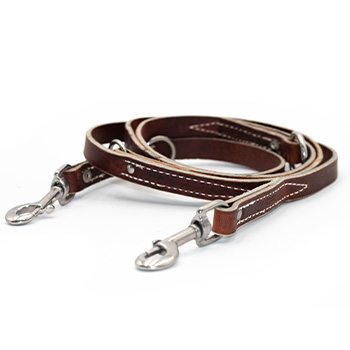
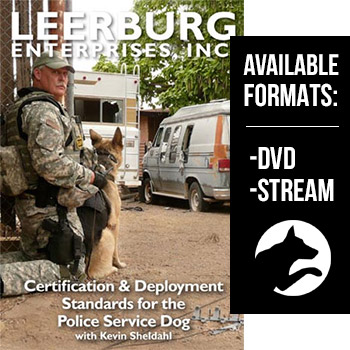
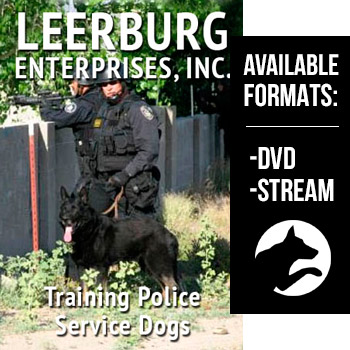
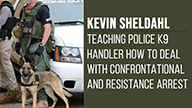
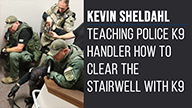

Ask Cindy.